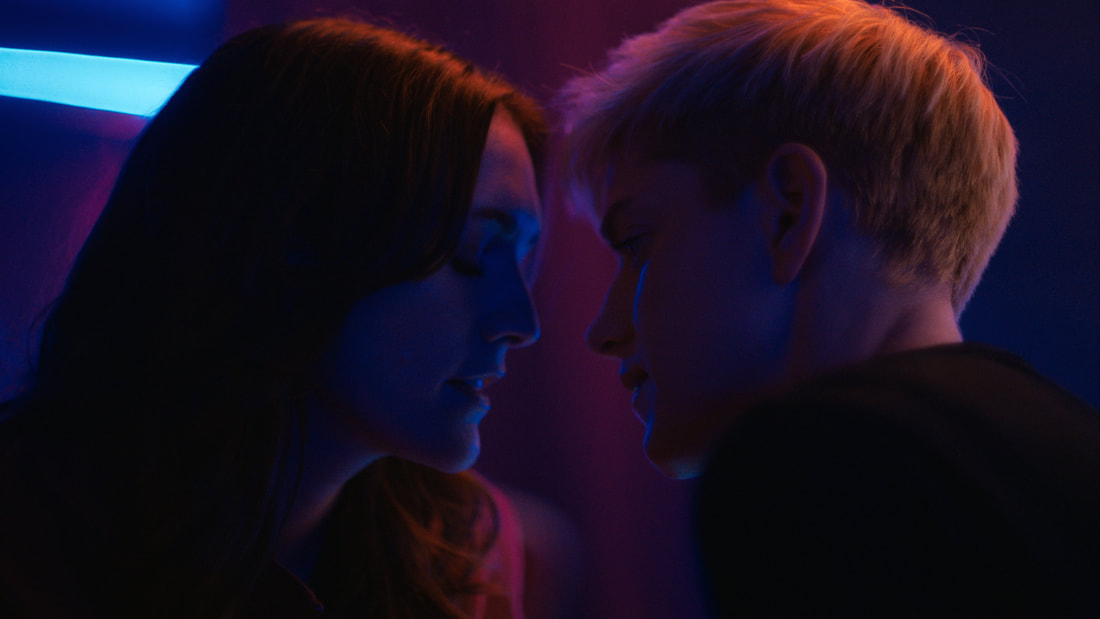|
Charlotte Ritchie and Mae Martin in Feel Good, Season Two (2021) Kicking off Pride Month is the wonderful continuation of a queer love story created and co-written by comedian Mae Martin. The semi-autobiographical comedy series Feel Good is back for a second and final season, bringing with it all the pathos and humour that shine in the first. Mae plays a fictionalized version of herself as a stand-up comedian and recovering addict. Following the success of season one, which premiered in March 2020 to glowing acclaim and BAFTA recognition, the story continues to explore Mae’s relationship with George (Charlotte Ritchie), a woman in her first queer relationship who was afraid of coming out. Season one leaves them in an ambiguous place, and the ambiguity never really goes away. So much of Feel Good is about the co-dependency in their relationship, the swapping of one addiction for another, and the uncertainty of what they want. The series excels beautifully at expanding conversations around the fluidity of gender identity and what that means to a relationship. Feel Good carries the story along with humour throughout, and portrays moments of light-heartedness even in the darkest scenarios, which strikes a truthful chord. Intended as a two-season trajectory, Mae Martin brings a heartfelt journey to a moving conclusion that still leaves a desire for more. The new episodes reach revealing emotional peaks starting with Mae, who returns to Canada on a healing journey after a relapse, and encounters dark facets of her past. Meanwhile in the UK, George is still teaching and feels uncertain about where she stands with Mae. Their complicated love story puts a question mark on their future. Mae is haunted by ghosts from her past and George tries to reinvent her present. How will they navigate being drawn back into each other’s lives? Can they continue to grow together in a healthy way? Season two rejoins Mae and George in an ambiguous place where they’re not entirely sure how to categorize their relationship status. Mae ponders what exactly she wants, and what is needed to reach a healthier emotional status. Season two delves into more mature subject matter about resonating themes, from co-dependency and labelling identity to consent and accountability. Joining Mae and George on this journey are a plethora of supporting characters reprising their roles from season one, plus a few new welcome additions to the cast. Lisa Kudrow and Adrian Lukis return as Mae’s parents, Linda and Malcolm. Kudrow plays Linda’s aloof personality to a tee; beyond the scathing quips and one-liners is a character whose detachment from Mae’s life comes from a place of fearing how to process Mae’s truth. Linda is an example of how the second season adds another layer to characters and portrays them in a new light. Among the new characters are Mae’s agent Donna Ridley, played brilliantly by Eleanor Matsuura. Her character joins one of the most resonating subplots of the season, which touches on the issue of sexual misconduct in the comedy world. The series engages in compelling discussion about the importance of a platform and how best to use it, as well as the promise of opportunities under the conditions of silence. Two more resonating characters, who Mae encounters at a rehab center in Canada, are played by Marisha Wallace and EVE. They each make a lasting impact with a short amount of screen time, and Wallace especially has such great comedic timing. While some of the characters make for more compelling screen time than others, the screenplay makes a refreshing point of leaning into everyone’s flaws rather than glossing over them. Lisa Kudrow, Mae Martin, and Adrian Lukis in Feel Good, Season Two (2021) Mae Martin in Feel Good, Season Two (2021) Feel Good speaks to the importance of staying true to yourself and feeling supported in each stage of discovering your identity in the LGBTQ+ community. For Mae, fluid in her gender and sexuality, the process of navigating through the intricacies of a relationship is challenging. Mae conveys this process so thoughtfully, and with an effortless sense of humour. Identifying as an Adam Driver or Ryan Gosling when asked how she defines herself sparks interesting and humorous discussion about labelling, which also conveys Mae’s hesitation to be placed in a box. The series is a great platform of acceptance for this character to just be who she is, at any given moment. Co-written by Martin and Joe Hampson, the series explores the muddled side of relationships where people are learning who they are and are not entirely sure what they need from each other. The actors continue to bring this complex dynamic to life very well. Mae shares excellent chemistry with Charlotte Ritchie; together they paint a picture of two people magnetically drawn to each other through thick and thin. Season two shows both characters in a more mature place, especially in terms of self-discovery. The second season also builds on the first by shining a light on Mae’s past, showing how particular circumstances led her to feel long-term emotional wounds as a result. Mae’s foggy recollection of her past relationships as a teenager manifest in so many different ways, affecting her career as a comic and the issues of morality within toxic environments.
While the progression of Feel Good is built for two seasons, the conclusion evokes a slightly incomplete and rushed feeling. The ambiguity that still surrounds Mae and George leaves behind a lot of room for more grounds to explore. But the journey they go on in the process is certainly enjoyable and so compelling to watch. This chapter in Mae’s life is full of new beginnings, milestone moments, the romanticism of relationships, and the addictive behaviors that she navigates through every day. The second and final season maintains the lightheartedness that makes the first one soar, with the added layer of more challenging plot points. Mae Martin’s Feel Good is an intimate, confronting, and endearing portrayal of love. The second and final season of Feel Good premieres globally on Netflix June 4th.
0 Comments
Leave a Reply. |
Archives
June 2024
Categories |




 RSS Feed
RSS Feed